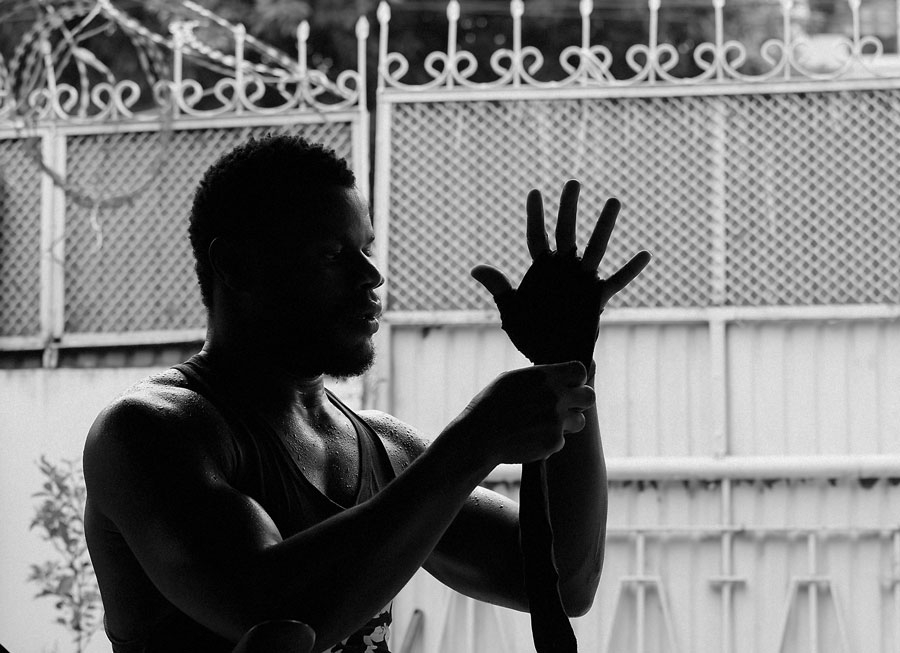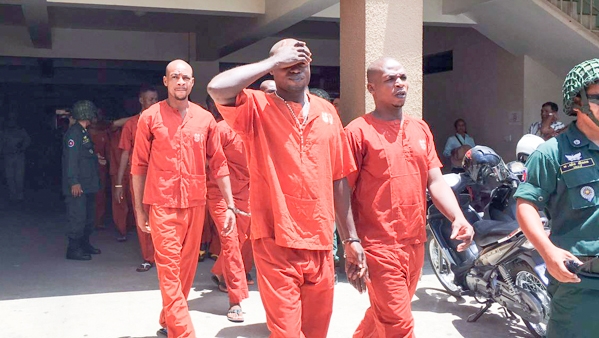His day starts at 7:30am in Phnom Penh with a 15-kilometer run, followed soon after by a sprightly two-hour bicycle ride, four hours at Superfit gym in Russian Market, two hours training with the Cambodian National Boxing Team at Olympic Stadium and two more hours learning a litany of moves from Yuthakun Khom fight master Chan Rothana.
This has been Emmanuel Onyedikachi’s life for the last 5 months as he trains for his first professional fight on October 30. The physically imposing neophyte slyly admitted to the magnitude of the task ahead of him: facing an experienced Cuban fighter after only five months of day-to-day fight training.
Many budding pugilists train for years before setting foot in a ring, honing specific skills through hours of sweat and repetition. But almost as many are like the 30-year-old Onyedikachi, finding their way to fighting through an ever-changing panoply of jobs and life experiences. They all believe that a more refined understanding of the fighter’s ethos mitigates their relative lack of functional fight experience.
“His weakness may be that he has no experience,” says his French manager Benoit Rigallaud. “But his physical fitness and mental fitness are very strong. He is so strong that if he catches the opponent with a good punch, the fight is over.”
The spirit of a fighter – what it takes to confidently stand in a ring across from another person – often can only be developed outside of that very ring.
And for Onyedikachi, it runs in his blood. Both his father and his uncle were boxers in his home country of Nigeria. Born in Anambra State and raised in Lagos, he can instantly think back to his days of wrestling and fighting with other kids and see the seeds of his now sprouting fight career.
He made his way to Cambodia almost eight years ago somewhat accidentally. He was headed to Malaysia to study, but his plans fell through and he ended up in Phnom Penh.
He started out as a teacher at the Austrian International School before creating a Hip-Hop dance group that performed around Phnom Penh. It was through the dance group that he initially met Rothana and had his first taste of fight training.
Through mutual friends, he met Rothana, and the two immediately hit it off, living and training together in Takhmao city while he helped out at his restaurant for four months. Onyedikachi now had just enough of a taste of fighting that he knew he needed more.
“I decided to become a personal trainer, so I studied fitness and got my personal trainer certificate online. I ended up working at Superfit for almost a year and a half,” he explains.
Emmanuel Onyedikachi trains for his first fight on October 30. (Photo: Steve Porte)
He worked with other Superfit coaches on gym training for six months before plying the trade on his own, becoming a personal trainer for a variety of wealthy Cambodians and expats.
After becoming the personal driver for one of his clients, he quit the job entirely and began work as a secretary assistant for the Emergency Lagos Contact Agency, spending a little over a year there before taking up work as the general manager of a PTT gas station.
But eventually he ended up as a personal trainer at the Cambodiana Hotel.
“The salaries were not satisfying. I’m trying to save enough and it wasn’t working. But I managed to open a business in my country. This is how I started training with Selapak and I began to become a fighter,” he said.
He knew Rigallaud from his days hanging out with Rothana and had played rugby with him while living in Takhmao. The pair help run the Selapak fight gym in Phnom Penh.
“He came to me and Rothana about six months ago and told us he wanted to fight. We told him the kind of work and effort he would have to put in and he was very motivated so he agreed,” Rigallaud says. “We told him: train first, train hard.”
And train hard he did. He struck up relationships with the Cambodian National Boxing Team and now trains with them on a daily basis.
“They say it’s very impressive because I am the first Nigerian to really try to fight here. So they appreciate it, for me to choose this as my career in Cambodia,” Onyedikachi says. “They all encourage me so much and want me to go far.”
Onyedikachi comes from a long line of fighters. His father and uncle were boxers in Nigeria. (Photo: Steve Porte)
Many might assume it would be hard for him to fit in with the average Cambodian fight crowd. But he speaks Khmer – he can even read a little as well – and says the team has embraced him like one of their own.
“At the beginning, when I got here, there was a bit of racism. But the boxing team treats me like family. I chose to fight in Cambodia to be a sort of representative of Nigeria. To show them that we as black people are not all into bad stuff,” he says.
“I want to show that we have some people who are thinking positive and doing good in their lives and that’s part of why I chose to be a fighter in Cambodia.”
From his training with the Cambodian Boxing Federation and his time hitting the bags with Rothana, Onyedikachi feels he is ready to lace up his shoes and step into the ring.
But his opponent, 30-year-old Felix Merlin, is a wily vet with 20 fights under his belt.
“I’m not scared, but I am nervous. With confidence, I’m not afraid. But it’s my first time,” he admits.
“The reason I can fight after only five months of training is because of Rothana. Not everyone can only train for four months and get a fight. It’s because he is a dedicated teacher and is highly qualified.”
A pure boxing match was his preference for his first fight because of his familiarity with it and his desire to continue working on his jiu jitsu and kicking skills before trying MMA.
“I decided to start with boxing because I think I’m good at it and confident in my hand skills. I am more confident with boxing than ground stuff, although I have experience in wrestling,” he says.
Whatever comes of his first fight, Onyedikachi says that deep down, this is what he has always wanted to do and plans to continue doing no matter what happens on the canvas this weekend.
“I want to fight as my career. My goal is not just to have fun with fighting,”
“I am dedicating my time to this, my energy to this, my strength, everything. I want to go higher. I am not doing this to become famous. It just makes me happy.”




